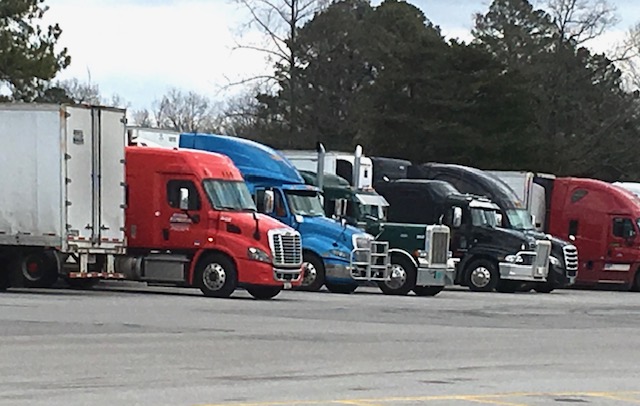By Al Muskewitz
In the most ordinary of times, the American economy runs on trucking. But these are extraordinary times and the country is looking towards the industry even more to keep it moving.
You know the saying, “If you’ve got it, it probably came by truck.” Never has it been more on-point than now as grocery stores, retailers and medical professionals await the next delivery to restock shelves laid bare by the demand on essentials as Americans react to the coronavirus pandemic.

The news has been filled with pictures of empty store shelves, prompting President Trump to assure Americans there are plenty of essentials in production and to just buy what they need because those goods would be arriving soon. And most them would be arriving by truck.
Mark Colson, president of the Alabama Trucking Association, and Brenda Neville, president of the Iowa Motor Truck Association, are proud of the way their industry – in their state and around the country – has responded to the crisis and believes it actually could lead the way in reducing the nation’s anxiety. Not only are America’s truckers bringing consumer goods likes toilet paper and hand sanitizer, they’re also hauling the equipment needed by responders and medical professionals.
“It is important for people to know that,” Colson said. “Right now, everyone, as it relates to consumer goods, just take a deep breath. There’s plenty of water, there’s plenty of toilet paper. We’re resupplying stocked shelves. Trucks are moving those products. It was just a really quick demand and they’re catching up. But there’s plenty. We’re not running out of any of that stuff right now.”
Trucking has always played an important role in times of crisis, but Colson agreed this crisis is different than the others. Most times the industry is called to go where the need is greatest in natural disasters that are regional in scope, reacting quickly and nimbly in a fluid situation to deliver emergency supplies to areas ravaged by hurricanes or tornados. The coronavirus crisis is nationwide, now impacting every state in the country, and frankly, global.
The sight of a big rig pulling into a store, retailer or manufacturer provides a sense of relief and normalcy in an otherwise chaotic time.
“There are a number of different agencies and industries that are stepping up, but quite honestly, the trucking industry is the critical ‘glue’ that is holding everything together,” Neville said. “What the trucking industry does best in these types of situations (crisis) is provide consistent and steady leadership by keeping the grocery store shelves stocked, gas/fuel readily available, medicine to the hospitals, and the list goes on and on. Every day trucking steps up and gets the job done and they do the same in a crisis situation.
“Nothing stops the ability of the trucking industry to serve this country in good times and in challenging times. That kind of consistent service brings some calm to the chaos and the average American doesn’t even realize how valuable that is, but we all are the biggest beneficiaries of the valuable service the trucking industry provides, especially in a crisis situation like we are experiencing now.”
“I think we have a responsibility as an industry to set that tone,” Colson said. “There will be families who don’t want their trucker to get on the road because we’re worried about them and we have to make sure they’re safe, but we can also show how to do important work, just like the health care community, during times of crises in a calm, thoughtful way.
“The thing I’m getting from truckers right now is we can do this, we’re going to do this, that it’s our responsibility to create some confidence and peace and calm, and by doing our jobs really well we can help set the tone for that. It’s almost like a public service in the sense of by doing our jobs really well we can solve some of the social anxiety issues.”

In a message to his constituents Thursday, Truckload Carriers Association chairman Dennis Dellinger described drivers as “national interests” in the battle and keeping them safe will keep America safe. He said it wouldn’t be dramatic to call a carrier CEO “a wartime leader.”
State and federal governments have recognized the importance of the trucking industry and drivers in the fight and stepped up to help with regulatory relief and services truckers are finding either denied or limited in these times of sweeping curfews, cancelations or closures.
On March 17, the FMCSA clarified its emergency declaration to provide hours-of-service relief for carriers and drivers providing “direct assistance” delivering emergency relief goods around the country.
Those goods include medical supplies and equipment related to the testing, diagnosis and treatment of COVID-19; supplies and equipment necessary for community safety, sanitation, and prevention of community transmission of COVID-19 such as masks, gloves, hand sanitizer, soap and disinfectants, food, paper products and other groceries for emergency restocking of distribution centers or stores; immediate precursor raw materials –such as paper, plastic or alcohol – that are required and to be used for the manufacture of essential items; fuel; equipment, supplies and persons necessary to establish and manage temporary housing, quarantine; persons designated by federal, state or local authorities for medical, isolation or quarantine purposes; persons necessary to provide other medical or emergency services.
The declaration stipulates direct assistance does not include routine commercial deliveries, including mixed loads with a nominal quantity of qualifying emergency relief added to obtain the benefits of the emergency declaration. It’s the first time the agency has issued nationwide relief and follows President Trump issuing of a national emergency declaration in response to the virus.
Meanwhile, Pennsylvania has reopened all of its rest stops for valuable truck parking that it had initially closed in an effort to mitigate the threat and spread of COVID-19 within the general motoring public. The rest stop closures haven’t happened in Alabama, but as the top advocate for the industry in his state, Colson has shared with the governor’s office and other state agencies the issues arising in other states and how they may relate to trucking in the Yellowhammer State.
“We’re working with our national and state partners to make sure the supply chain is protected,” Colson said. “We’re just like any other business except we can’t shut down. We’ve got to keep the supply chain moving and protected and safe so Americans can figure out how to function in this new normal for the time being.
“We’re going to get through this time. The economic impacts are uncertain right now, potentially severe, but in the short term trucking’s got to do its job safely and when issues pop up we’ve got to be able to work with governments in any state, in any municipality, to try to find solutions. It’s never going to be perfect, but we just have to be oriented towards finding solutions – and keeping calm to find solutions. There is no need for panic.”
The effort to help the industry and its front-line warriors continues. The day before the FMCSA clarification American Trucking Associations president Chris Spear sent a letter to the White House seeking policy considerations for drivers who may need relief renewing credentials during this time of shutdowns and cancelations, keeping rest stops and other services open to alleviate the pressure on weary drivers and providing guidance for driver health and safety.
The private sector also is getting on board to show appreciation and gratitude to professional trucker drivers Neville said “are going above and beyond to help during this time of craziness.” Fast-food restaurants, most of which get their supplies by big rig and have closed their dining rooms because of the virus, have made provisions for drivers who can’t get their rigs through the drive-thru to get a meal. Independent business and everyday Americans also are offering assistance and access to meals, parking and other trucker-centric items.
“I believe our Governor’s office, DOT and many other state agencies have done an excellent job with communicating with us and working with us on any issues that arise,” Neville said. “Having an open line of communication as well as genuine appreciation for the industry by state officials is so important and we have that here in Iowa. We are all being as proactive and forward thinking as possible to help with the movement of goods but since this is a totally new event, we are learning as we go, too, and the trucking community has been really outstanding in their response.”
Al Muskewitz is Editor of Wright Media. He can be reached at musky@wrightmediacorp.com


Be the first to comment on "Truckers, Now ‘National Interests,’ Leading the Way in Crisis Relief"